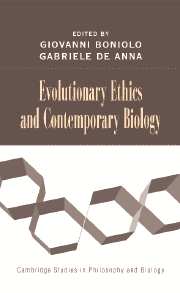Book contents
- Frontmatter
- Contents
- List of Contributors
- Evolutionary Ethics and Contemporary Biology
- Introduction
- PART I THE LIMITS OF EVOLUTIONARY EXPLANATIONS AND JUSTIFICATIONS OF ETHICS
- 1 Is Darwinian Metaethics Possible (And If It Is, Is It Well Taken)?
- 2 The Descent of Instinct and the Ascent of Ethics
- PART II METHODOLOGICAL ISSUES CONCERNING EVOLUTIONARY ACCOUNTS OF ETHICS
- PART III HOW BIOLOGICAL RESULTS CAN HELP EXPLAIN MORALLY RELEVANT HUMAN CAPACITIES
- PART IV HOW BIOLOGICAL RESULTS CAN HELP EXPLAIN MORAL SYSTEMS
- Index
- Cambridge Cultural Social Studies
- References
2 - The Descent of Instinct and the Ascent of Ethics
Published online by Cambridge University Press: 23 July 2009
- Frontmatter
- Contents
- List of Contributors
- Evolutionary Ethics and Contemporary Biology
- Introduction
- PART I THE LIMITS OF EVOLUTIONARY EXPLANATIONS AND JUSTIFICATIONS OF ETHICS
- 1 Is Darwinian Metaethics Possible (And If It Is, Is It Well Taken)?
- 2 The Descent of Instinct and the Ascent of Ethics
- PART II METHODOLOGICAL ISSUES CONCERNING EVOLUTIONARY ACCOUNTS OF ETHICS
- PART III HOW BIOLOGICAL RESULTS CAN HELP EXPLAIN MORALLY RELEVANT HUMAN CAPACITIES
- PART IV HOW BIOLOGICAL RESULTS CAN HELP EXPLAIN MORAL SYSTEMS
- Index
- Cambridge Cultural Social Studies
- References
Summary
Let us then liken the soul to the natural union of a team of winged horses and their charioteer. The gods have horses and charioteers that are themselves all good and come from good stock besides, while everyone else has a mixture. To begin with, our driver is in charge of a pair of horses; second, one of his horses is beautiful and good and from stock of the same sort, while the other is the opposite and has the opposite sort of bloodline. This means that chariot-driving in our case is inevitably a painfully difficult business.
Plato, Phaedrus, 246 a–dMORAL CAPACITY
Reflecting on the biological foundations of human moral behavior within a Darwinian framework should involve something too often forgotten: finding actual links with what Darwin proposed in his writings. This task should not be intended as a philosophically idle form of deference to an author of the past, but as a necessary step to recover the correct historical and theoretical bases of the problems we are facing. Indeed, an interest in the history does not necessarily mean to commit fallacies akin to argumentum ad verecundiam, but it can take the form of a correct argumentum ad auctoritatem. In considering what Darwin wrote about the biological bases of morality, I will recall some of the theses of The Origin of Species and The Descent of Man that, mutatis mutandis, could be accepted without much difficulty by those who believe in the correctness and validity of (neo-)Darwinian evolutionism.
- Type
- Chapter
- Information
- Evolutionary Ethics and Contemporary Biology , pp. 27 - 40Publisher: Cambridge University PressPrint publication year: 2006
References
- 1
- Cited by



